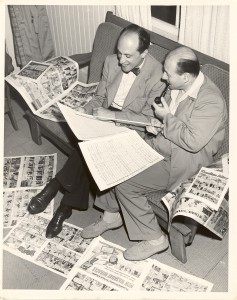 The son of a Viennese physician, Frederick Piket (born Sigfried) played the violin at the age of five and became a student at the famous Vienna State’s Conservatory while in high school, studying violin, piano and music theory. After finishing high school, at the insistence of his father, he studied at medical college for two and a half years, but finally resolved the conflict and his father reluctantly gave his support to the idea that his son would concentrate on studying piano, music theory (counterpoint and composition) and conducting solely to prepare himself for a career as a conductor.
The son of a Viennese physician, Frederick Piket (born Sigfried) played the violin at the age of five and became a student at the famous Vienna State’s Conservatory while in high school, studying violin, piano and music theory. After finishing high school, at the insistence of his father, he studied at medical college for two and a half years, but finally resolved the conflict and his father reluctantly gave his support to the idea that his son would concentrate on studying piano, music theory (counterpoint and composition) and conducting solely to prepare himself for a career as a conductor.
As a young man, Piket held various posts as a conductor for opera and operetta companies in Austria, Switzerland, and Germany. During this time, however, his interest in composition grew to the point where he took up residence in Berlin in order to pursue further studies in composition at the famous Musik Hochschule (Now Universitat der Kunst) where he was awarded a scholarship to study at the school’s master class for composition under the famous teacher and composer, Franz Schreker.
Two years later, Piket won the prestigious Mendelssohn Award. In 1933, when Hitler and the Nazis came to power in Germany, he migrated to Barcelona, Spain where he remained seven years. The Spanish Civil War made it unusually difficult for a foreign composer in Spain and Piket supported himself by playing piano and violin.
In 1940, at last, he received an immigration quota to the United States, and from that time, Piket resided in New York City until his death February 28, 1974. He became a U.S. citizen in 1946.

A Publicity Still For The Funnies with New York Philharmonic Conductor Franco Autori
Here, Piket wrote several compositions that gave testimony of his growing interest in the cultural background of his new country, among his early American works are the suite “The Funnies”, the Variations for Orchestra on “Go Down Moses”, and the overture “Curtain Raiser to an American Play.”
Through a series of coincidences, Piket became acquainted with the aspirations of Reform Judaism and its musical aspects, and he decided to take an active part in this creative movement. For this purpose, he took up organ studies and, while playing in several synagogues, began composing a series of pieces for the Jewish Sacred Service. (See list of publications.) He soon achieved renown as a liturgical composer in the Reform Jewish movement.
Piket also continued to compose secular music, and his orchestral works have been performed by the New York Philharmonic (under Mitropoulos and Autori), the Buffalo Symphony Orchestra, the Toronto Philharmonic, and the Indianapolis Symphonic Orchestra (under Savitsky).
Isaac Levi, a one act opera, has had numerous performances throughout the U.S. in Jewish Community Centers, synagogues, etc. The choral works of Piket have been conducted by Robert Shaw and Hugh Ross and are done in countless colleges and choral groups. Jan Peerce recorded “Ahavas Olom”. Several prominent synagogues and groups commissioned his compositions. He was a member of ASCAP and was listed in WHO’S WHO IN THE EAST.
A former professor at New York University, at the time of his death, Piket was actively engaged as instructor at the Hebrew Union College School of Sacred Music and Music Director of the Free Synagogue of Flushing, both in New York.
